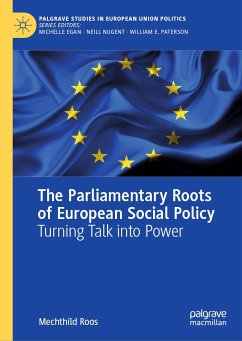-Berthold Rittberger, Chair of Political Science and International Relations at Ludwig Maximilian University of Munich, Germany.
"This is a superb work of exceptional scholarship: meticulously researched, persuasively argued, and beautifully written by an outstanding historian of European political and economic integration. [...] Roos blends ideas, institutions, personalities, policies, and politics into a fascinating account of early European Union history."
-Desmond Dinan, Professor of Public Policy and Jean Monnet Chair in European Public Policy at George Mason University, Virginia, USA.
"With this meticulously researched book [...] Roos demonstrate[s] not only the substantive policy influence of the EP in the realm of social policy during these early years, but also the important role played by MEPs themselves in pushing for increased institutional power and European integration. [...] This book is an important, and long overdue, contribution to the study of the European Parliament and the institutional evolution of the European Union more generally."
-Amie Kreppel, Jean Monnet Chair (ad personam), Director Center for European Studies and Professor of Political Science at University of Florida, USA.
The European Parliament (EP) - a powerful actor in today's European Union - was not intended to be more than a consultative assembly at first. Yet this book shows that the EP was much more influential in shapingCommunity policy in the early years of the integration process than either the founding Treaties or most existing scholarship would allow. It studies the EP's institutional evolution through the lens of Community social policy, a policy area with a particularly strong ideational dimension. By promoting a European social dimension, Members of the EP (MEPs) presented the Parliament as the true representative of European citizens by channelling their interests and needs. MEPs thus emphasised the EP's role as a provider of democratic legitimacy for Community politics, whilst at the same time trying to convince European citizens that the Communities could have a real and positive impact on their everyday lives.
Mechthild Roos is Lecturer in Comparative Politics, Augsburg University, Germany.
Dieser Download kann aus rechtlichen Gründen nur mit Rechnungsadresse in A, B, BG, CY, CZ, D, DK, EW, E, FIN, F, GR, HR, H, IRL, I, LT, L, LR, M, NL, PL, P, R, S, SLO, SK ausgeliefert werden.









